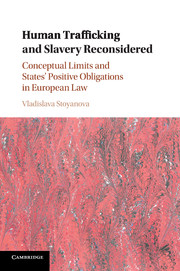Crossref Citations
This Book has been
cited by the following publications. This list is generated based on data provided by Crossref.
Fudge, Judy
2018.
Modern Slavery, Unfree Labour and the Labour Market.
Social & Legal Studies,
Vol. 27,
Issue. 4,
p.
414.
Molland, Sverre
2019.
On trafficking survivors: biolegitimacy and multiplications of life.
Dialectical Anthropology,
Vol. 43,
Issue. 3,
p.
279.
Bearup, Luke S
2019.
The Palgrave International Handbook of Human Trafficking.
p.
1.
Stoyanova, Vladislava
2019.
The Palgrave International Handbook of Human Trafficking.
p.
1.
Demetriou, Daphne
2019.
The Mens Rea of Human Trafficking: The Case of Migrant Domestic Workers.
International Criminal Justice Review,
Vol. 29,
Issue. 3,
p.
262.
Gombeer, Kristof
Ulusoy, Orçun
and
Basilien-Gainche, Marie-Laure
2019.
Border Deaths.
Herceg-Pakšić, Barbara
2019.
A contribution to slavery debate: Domestic labour of migrant children in focus.
Zbornik radova Pravnog fakulteta, Novi Sad,
Vol. 53,
Issue. 4,
p.
1365.
Webb, Philippa
and
Garciandia, Rosana
2019.
STATE RESPONSIBILITY FOR MODERN SLAVERY: UNCOVERING AND BRIDGING THE GAP.
International and Comparative Law Quarterly,
Vol. 68,
Issue. 3,
p.
539.
Milano, Valentina
2020.
Human Trafficking in Conflict.
p.
173.
Elliott, Sarah
and
Denise Smith, Megan
2020.
Simulating a Multi-agency Approach for the Protection of Trafficked Persons in Migration and Displacement Settings.
Journal of Human Trafficking,
Vol. 6,
Issue. 2,
p.
168.
Stoyanova, Vladislava
2020.
The Palgrave International Handbook of Human Trafficking.
p.
1393.
Stoyanova, Vladislava
2020.
Fault, knowledge and risk within the framework of positive obligations under the European Convention on Human Rights.
Leiden Journal of International Law,
Vol. 33,
Issue. 3,
p.
601.
Bearup, Luke S.
2020.
The Palgrave International Handbook of Human Trafficking.
p.
1587.
Kahimba, Nicksoni Filbert
2021.
Human Trafficking Under International and Tanzanian Law.
Vol. 27,
Issue. ,
p.
89.
Bearup, Luke S.
2021.
The Palgrave International Handbook of Human Trafficking.
p.
1.
Ghazaryan, N.
2021.
The Evolving Nature of EU External Relations Law.
p.
333.
Šurlan, Tijana
2021.
Prohibition of trafficking in human beings under the auspices of human rights.
Bezbednost, Beograd,
Vol. 63,
Issue. 2,
p.
5.
Kahimba, Nicksoni Filbert
2021.
Human Trafficking Under International and Tanzanian Law.
Vol. 27,
Issue. ,
p.
335.
Kahimba, Nicksoni Filbert
2021.
Human Trafficking Under International and Tanzanian Law.
Vol. 27,
Issue. ,
p.
27.
Kahimba, Nicksoni Filbert
2021.
Human Trafficking Under International and Tanzanian Law.
Vol. 27,
Issue. ,
p.
1.





